The art of the Christmas window display
- Published
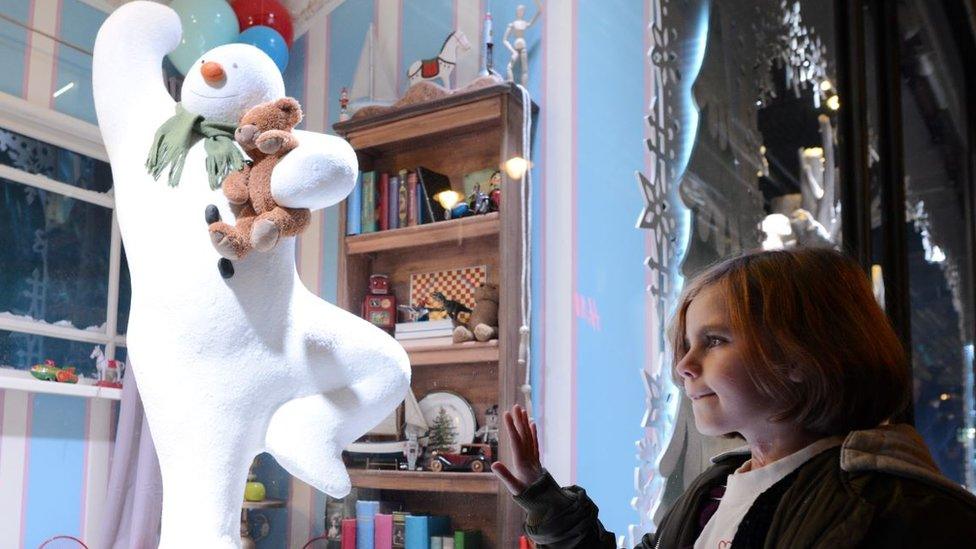
You may still be wrapping this year's Christmas presents but window dressers throughout the land are already planning their festive displays for December 2019. Just how do they create these often impressive spectacles and how do they hook in the shoppers?
Christmas displays are a staple of many a High Street during the festive season. Alongside the more traditional sights rooted in the nativity and fairytales are the more unusual themes of sparkly sprouts, llamas and naughty polar bears.
But the road to success starts not on 1 December, but far, far earlier.
Mark Neilly, senior creative project manager at Hello Flamingo, which specialises in window display design for firms like Habitat and Selfridges, said UK retailers start planning in January.
"Christmas window and in-store schemes are normally the biggest projects of the year for brands and retailers, and it is where most visual merchandising and marketing budgets are allocated to," he explains.
Retailers often take a cue from the "world class and innovate" displays showcased in New York City, drawing inspiration from the exteriors of stores like Saks Fifth Avenue.
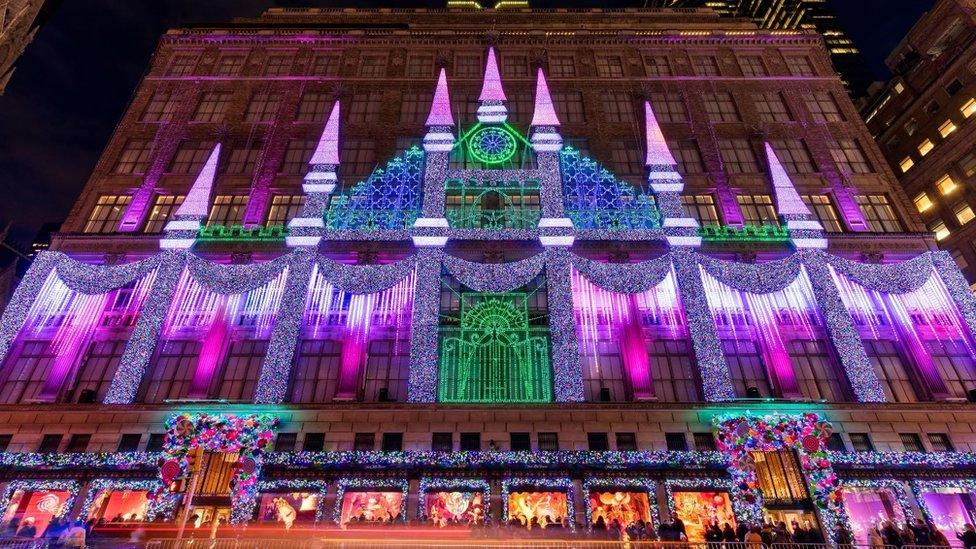
Saks Fifth Avenue in New York makes use of neon lights and colour to create an eye-catching display
At the Fenwick department store in Newcastle, they are already "well on the way with themes and creative concepts for 2019", says its head of creative, Paul Baptiste.
"Theatre and storytelling [is] at the heart of what we do," he says.
"The window displays create memories for generations of our communities and they will always have an important place in each of our stores."
This year, scenes from Raymond Briggs's classic, The Snowman, fill the window.
It is a celebration of the story's 40th anniversary and features some of the film's most well-known moments, including the ice-skating snowmen and the flight around the globe.
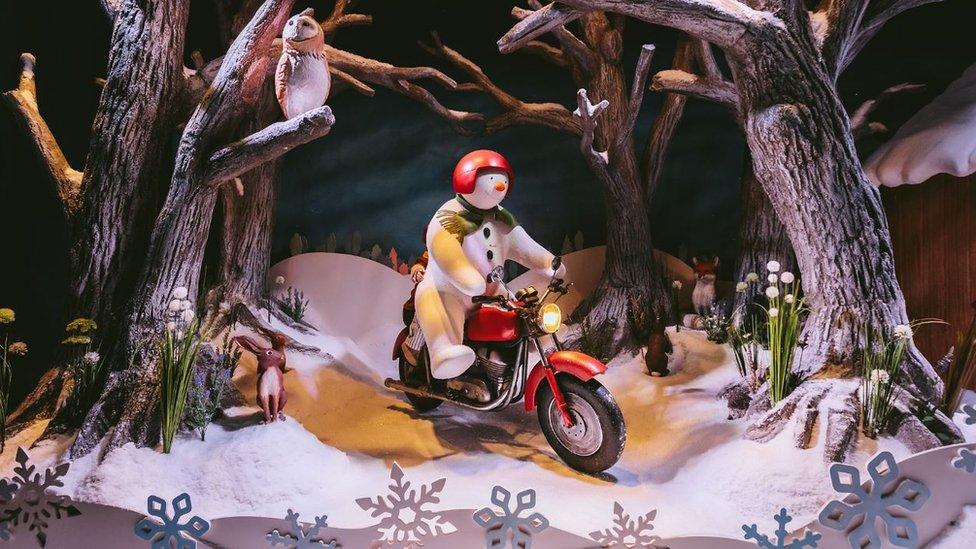
Fenwick's window display features scenes from The Snowman
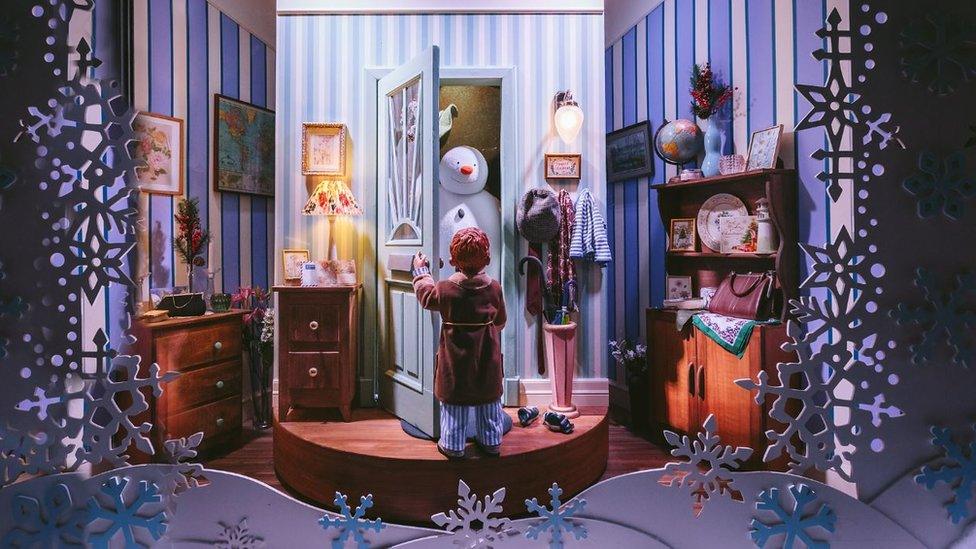
The store hopes it brings Raymond Briggs's story to life
Drawing on fairytales and well-known stories is a tried and tested route, but every year brings with it the desire to come up with something fresh.
Even with 160 years of Christmas display experience behind them, Harrods in London tries to do something different with their 27 windows.
"Every year we face the challenge of reinventing the magic of Christmas in a fun, imaginative way while staying true to the traditions of the season," says the shop's creative visual director, Alex Wells-Greco.
"A big part of our inspiration has been the idea of festive feasting, something we also celebrated in a 1950s window display, which featured a giant Christmas cake, and a number of miniature chefs.
"[This year] we've even erected an 8ft Christmas tree on Hans Crescent, covered in sparkling Brussels sprouts and embellished lobsters, and topped with a glitzy champagne bottle."
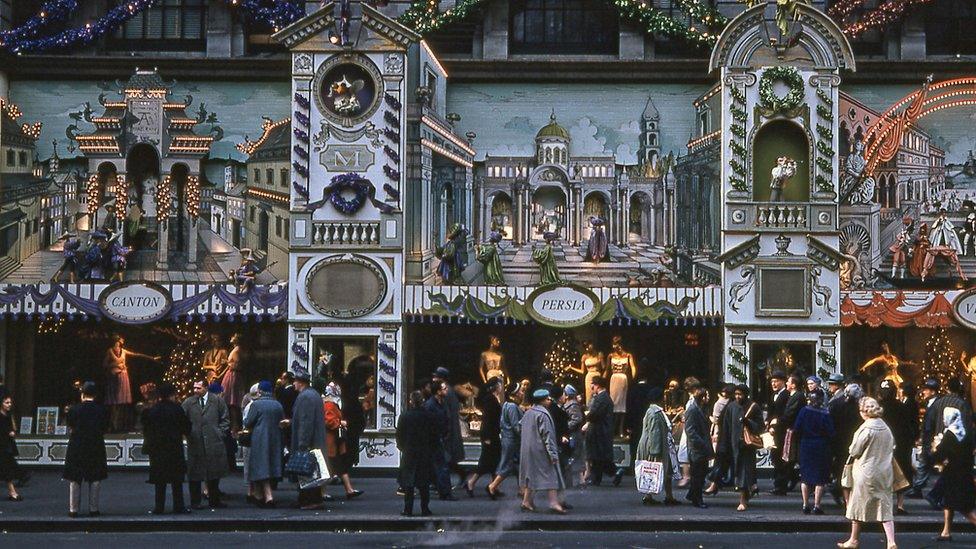
Saks has long provided inspiration for Christmas displays
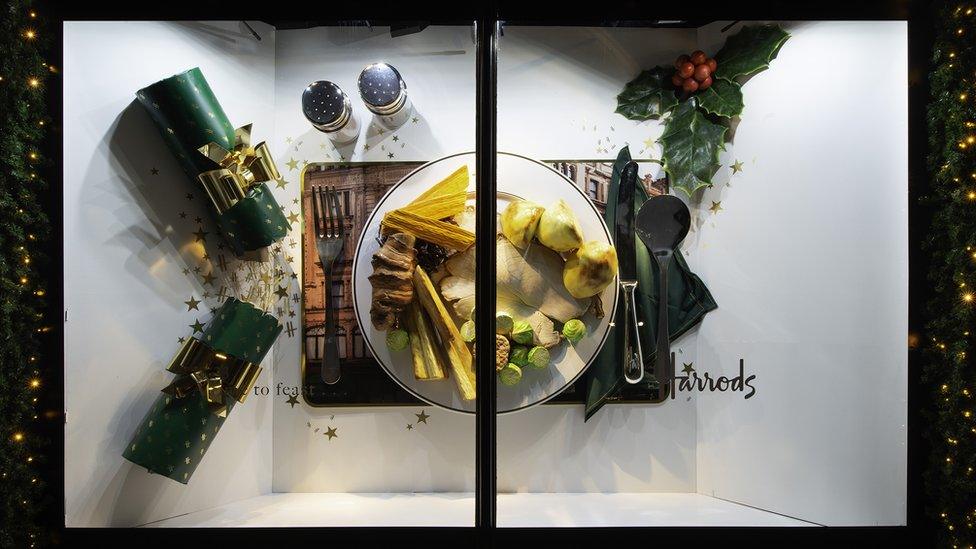
"Festive feasting" has influenced Harrods' display this year
Others favour a more immersive approach.
At Castle Gardens in Sherborne, Dorset, the display features music and smells, and is all about "tantalising the senses", says director Louise Burks.
This year's display features a "unicorn dreamland", a 1980s-themed section, llamas, pom-poms and Frida Kahlo embroidered cushions.
Izzy Pilcher painstaking hung slinky spring toys and suspending Rubik's Cubes from the ceiling, as well as making a wall of shiny tinsel.

More modern displays have featured llamas and Frida Kahlo cushions
"It's a tactile area and we want visitors to touch everything, really be absorbed in it," she says.
"But it's a weekly job just to re-hang and untangle them."
You might also be interested in:
Fancy advent calendars - rip-off or festive fun?
Mulled wine... in a slow cooker- - BBC News
'Saving Christmas' for lonely cats - BBC News
Straying from the traditional is increasingly common practice and Castle Gardens, for example, has featured Strictly Come Dancing, Great British Bake Off and I'm a Celebrity in its previous displays.
But retailers are also focusing more on the idea of gifting, says Mr Neilly, promoting the season's "must-haves" which can handily be bought in store.
However, this backfired in Nottingham when feminists branded a Marks and Spencer display suggesting women need "fancy little knickers" as "vomit-inducing".
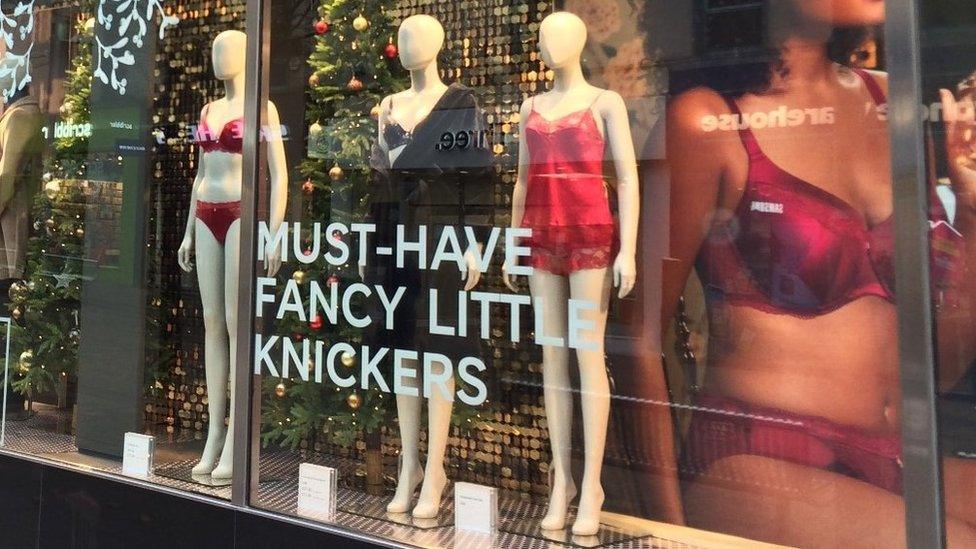
Marks and Spencer's windows in Nottingham were criticised
The shop's apparent display faux pas was not the only one to make headlines.
A pair of stuffed polar bears re-arranged in a compromising position also shocked shoppers on the Isle of Man, giving - as one person quipped 0 "new meaning to riding the Polar Express".
Meanwhile, on Oxford Street in London, a major retailer scrapped using fake snow after the store ended up resembling a "foam party", says Mr Neilly.
"[It] had to be mopped out by store staff on an hourly basis."

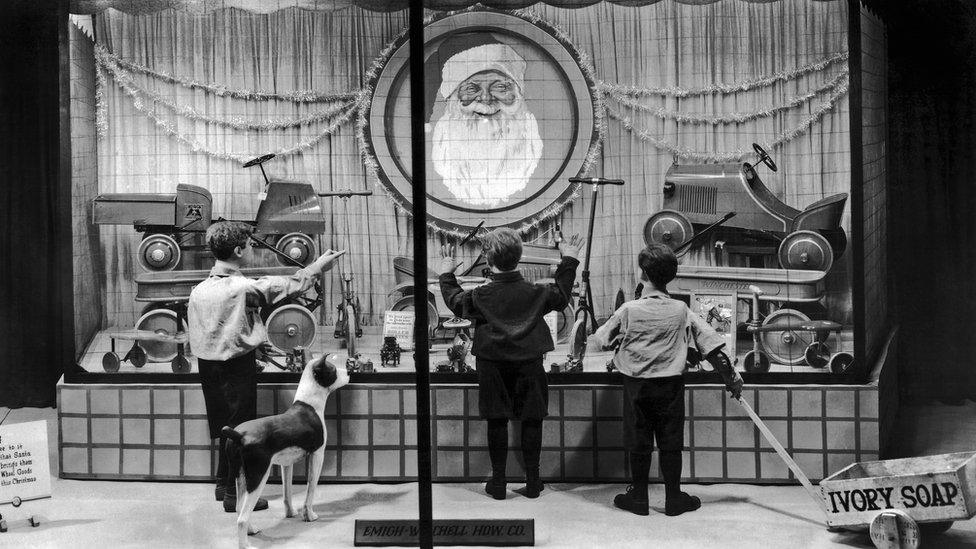
The windows of Christmas past
Macy's in New York is said to have pioneered the tradition of the Christmas window in the 1870s
Although the animations in the window displays of the grands magasins in Paris are said to have inspired Fenwick
Le Bon Marché's first Christmas window was in 1893 - later followed by Printemps, Galeries Lafayette and Bazar de l'Hôtel de Ville
The first Harvey Nichols Christmas windows were installed in the 1890s
It is not known when Harrods started doing Christmas windows, but one of the earliest was in 1931, featuring a tableau of the Old Woman Who Lived in a Shoe

With increasing pressure to improve on last year's display - and competition to attract shoppers to the High Street tougher than ever - perhaps it is to be expected that experimentation might occasionally lead to unintended results.
So how can success be guaranteed? Lighting, for one, is key to a display, according to Mr Neilly.
"The use of neon and faux neon has been on the rise, as it can be extremely adaptable to traditional and also very modern schemes," he adds.
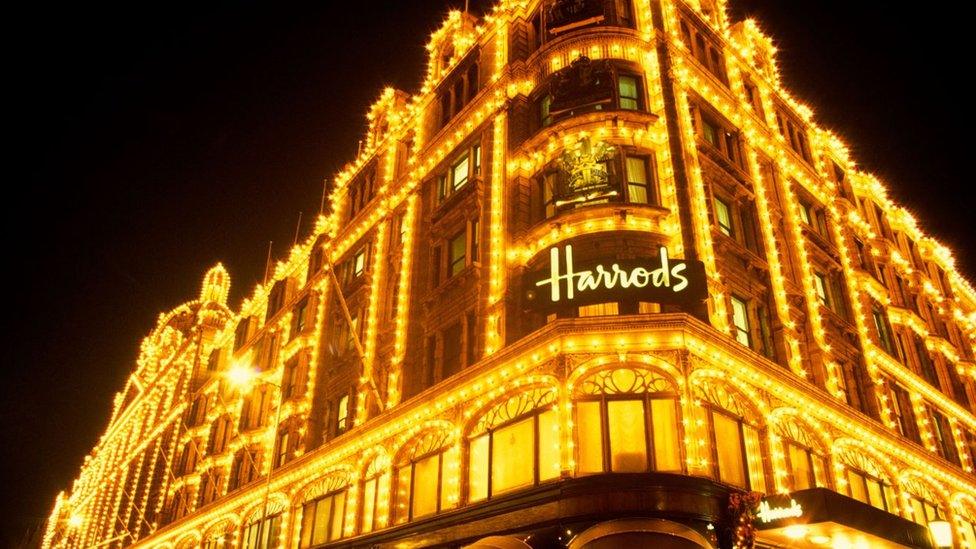
Harrods kept the 12,000 exterior light bulbs added as a decoration in 1959
It has certainly worked for Harrods, whose 12,000 exterior light bulbs added as a decoration in 1959 became so popular that they made them a permanent fixture.
"I think lots of stores try to totally modernise and rewrite Christmas, and it doesn't need to be rewritten," advises Mr Wells-Greco.
"Christmas is Christmas - you just need to make it relatable to everyone."
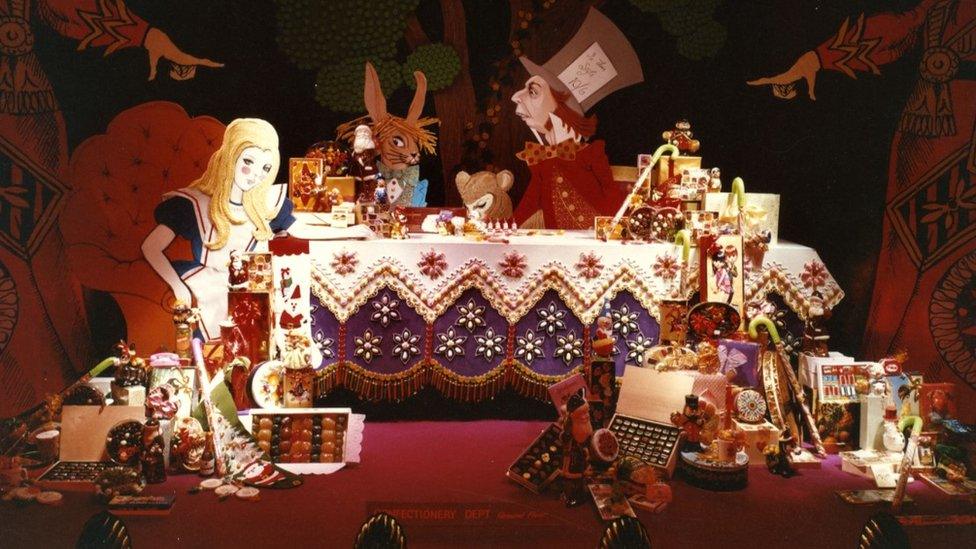
Lewis Carroll's Alice In Wonderland has been a recurring Christmas theme for Harrods, featured here in 1969